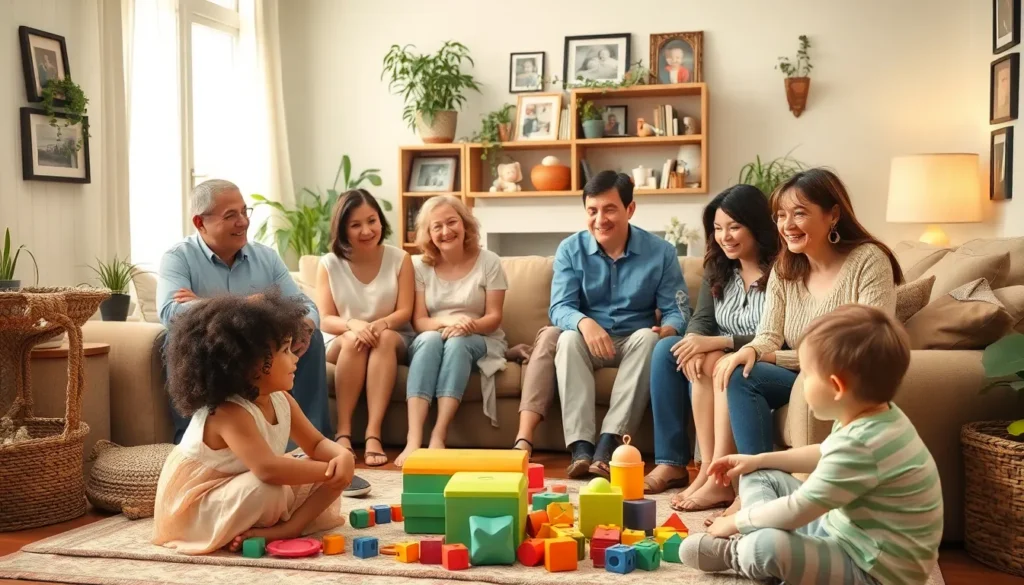Table of Contents
ToggleAdopting a child is like jumping into a rollercoaster ride—exciting, a little scary, and full of unexpected twists. But what happens when the ride gets bumpy? That’s where adoption transition support comes in, acting as the safety bar that keeps everything in place. It’s not just about paperwork and legalities; it’s about smoothing out the emotional ups and downs for both parents and kids.
Imagine navigating the wild world of new family dynamics without a map. Adoption transition support provides guidance, helping families adjust to their new normal with humor and heart. It’s the secret sauce that turns chaos into connection, ensuring everyone feels seen and heard. So buckle up and get ready to explore how this vital support can make all the difference in a family’s journey.
Overview of Adoption Transition Support
Adoption transition support provides essential resources and guidance for families during the adoption journey. This support helps parents and children adapt to their new relationships and emotional dynamics. Navigating the transition can involve various challenges, such as bonding, communication, and behavioral adjustments.
Numerous organizations offer specialized programs aimed at enhancing adoption transition experiences. Educational resources, workshops, and counseling services equip families with the tools they need. Support groups create safe spaces for parents to share experiences and concerns, fostering community and understanding.
Families often encounter unique emotional needs during this time. Children may experience feelings of loss, confusion, or attachment issues. Addressing these emotions through therapy or mentoring can prove beneficial. Additionally, adopting families require continuous encouragement and acknowledgment of their feelings.
Research indicates that successful transition support can lead to improved long-term outcomes for adopted children. Children demonstrate enhanced emotional health when they receive consistent guidance. Ready access to experienced professionals assists families in managing specific challenges as they arise.
Practical aspects of transition support also play a critical role. Home visits from social workers and post-adoption services offer hands-on assistance tailored to each family’s situation. Such services help alleviate stress by providing personalized support during crucial adjustment periods.
Establishing a connection with other families who share similar experiences can significantly boost confidence. Networking with those who have been through similar challenges helps normalize the feelings surrounding adoption. Continuous support builds resilience and strengthens family bonds during the adjustment phase.
Importance of Adoption Transition Support

Adoption transition support plays a crucial role in ensuring a successful integration for families and children. It addresses emotional needs and fosters connections essential for long-term well-being.
Emotional Well-being
Emotional well-being significantly impacts the adjustment process for adopted children. Feelings of loss, confusion, and attachment issues often emerge during this transition. Accessing therapy or mentoring can help children process their emotions. Research shows that effective support contributes to improved emotional health. Additionally, consistent guidance from trained professionals aids in establishing a sense of security. Providing parents with resources to address these feelings enhances the overall family environment. Consequently, emotional stability thrives when families receive the right support during this pivotal time.
Social Integration
Social integration is vital for adopted children as they adapt to new family dynamics. Building friendships and connections within their community can ease feelings of isolation. Support groups foster opportunities for shared experiences and advice. Engaging children in social activities promotes confidence and self-esteem. Involvement in community programs helps families connect with others facing similar challenges. Creating an inclusive atmosphere encourages openness and understanding among peers. Ultimately, social integration strengthens family bonds and fosters a sense of belonging.
Types of Adoption Transition Support
Adoption transition support comprises various forms that assist families before and after welcoming a child. These types include pre-adoption and post-adoption support, both crucial for successful transitions.
Pre-Adoption Support
Pre-adoption support offers families valuable resources before the child arrives. Agencies provide training on child development and attachment. Workshops typically cover topics like trauma-informed care and parenting techniques specific to adopted children. Support groups create spaces for future parents to share experiences and gather insights from seasoned adoptive families. Access to informational materials assists in preparing families for the emotional and practical challenges of adoption. Specialized counseling helps address individual concerns and fears, positioning families for a smoother transition once the child joins their home.
Post-Adoption Support
Post-adoption support focuses on the family unit after the adoption is finalized. Counseling services remain available, assisting families in addressing emotional concerns that arise during the adjustment period. Connecting with support groups fosters community, allowing parents to share successes and challenges. Educational resources provide information on behavior management and effective communication strategies. Families benefit from ongoing training tailored to their child’s unique needs, facilitating bonding and adaptation. Access to therapists or mentors aids children in processing feelings of loss and attachment, contributing to positive long-term outcomes.
Best Practices in Adoption Transition Support
Effective adoption transition support combines various approaches to ensure a smooth adjustment for both families and children. Key practices involve offering targeted training and enhancing engagement with birth families.
Training for Professionals
Insightful training for professionals includes comprehensive educational programs focusing on trauma-informed care and child development. Organizations provide workshops to equip social workers, educators, and therapists with techniques specific to adopted children. These programs promote best practices that address emotional complexities and unique behavioral needs. Continuous professional development fosters an understanding of the latest research and trends in adoption transition support. Enhanced expertise among professionals leads to improved outcomes for adoptive families and children.
Involvement of Birth Families
Including birth families in the adoption process can significantly enhance transition support. Open communication creates opportunities for adopting families to connect with birth parents, allowing for shared experiences and understanding. This involvement helps adoptive children maintain a sense of identity and heritage. Support services that facilitate these connections address potential feelings of loss and abandonment. Engaging birth families encourages a collaborative approach, fostering holistic support for the adopted child.
Challenges in Adoption Transition Support
Adoption transition support faces various challenges that can complicate the integration of a child into a new family. Understanding these obstacles is crucial for effective support.
Communication Barriers
Communication barriers often impede the bonding process between parents and adopted children. Language differences can create misunderstandings, affecting emotional connections. Many adoptive families face difficulties expressing needs and feelings, leading to frustration and isolation. Active listening skills and open dialogue are essential for breaking down these barriers. Support services that provide resources on effective communication techniques also prove beneficial. Additionally, training for parents in empathy and conflict resolution promotes stronger family dynamics.
Cultural Considerations
Cultural considerations play a significant role in the adoption process. Families adopting children from different backgrounds may encounter challenges understanding their child’s cultural identity. Integrating cultural traditions can enhance the child’s sense of belonging and identity. Resources that educate families about their child’s cultural heritage support this integration. Furthermore, communities that celebrate diverse backgrounds contribute positively to adopted children’s adjustment. Engaging in cultural events enables families to embrace and honor their child’s roots, reinforcing emotional ties and overall well-being.
Adoption transition support plays a pivotal role in creating a nurturing environment for families and adopted children. By providing essential resources and fostering connections, it helps ease the emotional complexities of this journey. The focus on both pre-adoption and post-adoption support ensures families are well-prepared and equipped to handle the challenges they may face.
Engaging with professionals and support groups can enhance understanding and communication, ultimately strengthening family bonds. Recognizing the unique needs of adopted children and their birth families creates a more inclusive approach to adoption. With comprehensive support in place, families can navigate the rollercoaster of adoption with confidence, leading to healthier relationships and improved emotional well-being for everyone involved.





